Duke Energy money fuels North Carolina Republicans as they pursue latest gerrymander
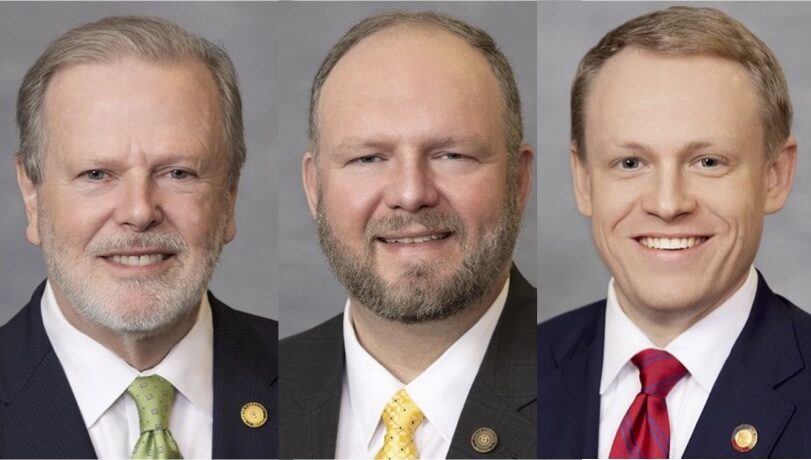
Duke Energy has quietly become one of the most powerful funders behind North Carolina’s Republican Party and politicians, at a time when state GOP leaders have pursued their latest congressional gerrymander. The Charlotte-based monopoly utility company, which supplies electricity to most of the state, is among the top donors to the Republican lawmakers who led last month’s mid-decade redrawing of the map.
State Senate President Pro Tem Phil Berger, House Speaker Destin Hall, and Senate Elections Committee Chair Ralph Hise — the chief architects of an unpopular redistricting effort that eliminated the state’s (and perhaps the entire Southeast’s) only competitive congressional seat — are all top recipients of money from the Duke Energy Corporation PAC. The PAC, which is funded by current and past company directors and employees, has poured almost $200,000 into their individual campaigns over the course of their careers.
“Duke Energy consistently tops the list of corporate PACs in the state,” Bob Hall, former executive director of Democracy NC, a voting rights organization, told the Energy and Policy Institute. “The PAC is a key way Duke influences legislation and protects its state-sanctioned monopoly status.”
The company retains a squadron of lobbyists in Raleigh, and its executives regularly host fundraisers and donate to lawmakers. Duke Energy also contributed corporate money to the state GOP for the first time this year, using a new loophole lawmakers created to evade North Carolina’s ban on direct corporate donations to political parties.
Duke Energy and its PAC did not respond to a request for comment.
Despite the state’s near-even partisan divide, the new map is expected to shift the state congressional delegation’s current split of 10 Republicans and four Democrats to a more-likely 11 Republicans and three Democrats. In taking credit for personally crafting the district, Hise said his purpose was “simple and singular — draw a new map that will bring an additional Republican seat.”
Duke Energy’s PAC has donated to the leaders of the gerrymander requested by President Trump, including:
- Over $107,000 to Berger’s campaign since he was elected to the Senate in 2000 — more than any other lawmaker in that time. Duke was his third-biggest donor overall, surpassed only by two Republican groups.
- Almost $46,000 to Hise since his 2010 election, when Republicans took control of the North Carolina legislature for the first time since Reconstruction. That puts him among the PAC’s dozen biggest recipients in that period, with Duke’s PAC among his half-dozen top donors.
- Over $31,000 to Hall’s campaign since his 2016 election, placing him among the top 15 recipients of the PAC’s money in that time. Duke’s PAC is Hall’s third-biggest contributor, following the realtors’ and trial lawyers’ associations.
Democratic Gov. Josh Stein condemned the new congressional map, which breaks up a district that has sent a Black Democrat to Washington for over three decades, and which is part of an existing lawsuit over racial gerrymandering. But Stein can’t veto the map due to a 30-year-old state law that bars governors from blocking electoral maps. However, the mapmakers are already facing legal challenges, including from a group led by former U.S. Attorney General Eric Holder, who said the new map “denies black voters equal representation.”
The Duke Energy PAC has not donated to any of Stein’s campaigns for state senator, attorney general, or governor, according to FollowTheMoney.org. It also did not donate to the campaign of Stein’s Republican gubernatorial opponent, Mark Robinson.
Duke’s Valentine to the NC GOP
As Duke Energy’s PAC donated heavily to North Carolina legislative Republicans in recent years, GOP lawmakers repeatedly championed laws that advantage the company over its customers. These include allowing Duke to set rates for multiple years at a time, which makes it harder to claw back overpayments to the company, and forcing customers to pay for power plants before construction is complete, putting them at financial risk should a project go awry.
Last year the GOP-controlled legislature also gave Republicans the ability to appoint a majority of members to the state utilities commission that regulates Duke Energy, taking that power away from the Democratic governor. Republicans subsequently appointed Donald van der Vaart, a climate science denier who has proven to be a passionate defender of coal power, a particularly polluting energy source. Duke Energy recently proposed extending the life of three North Carolina coal plants.
This year Duke Energy found a new way to boost the state GOP. The company’s latest corporate political expenditure report, covering the first half of this year, shows a first-time donation of $100,000 to the “North Carolina Republican Party,” but state law bars corporations from donating directly to political parties. In fact, Duke’s money went to the North Carolina Republican Party Building Fund, to which the company is the single biggest corporate donor.
Such building accounts were originally intended to help party organizations maintain headquarters. But during last year’s lame-duck session, before losing their legislative supermajority, Republicans relaxed the rules on how building funds can spend their contributions. The change made them more attractive to businesses like Duke Energy and other interests seeking to cultivate political influence, according to data from Transparency USA.
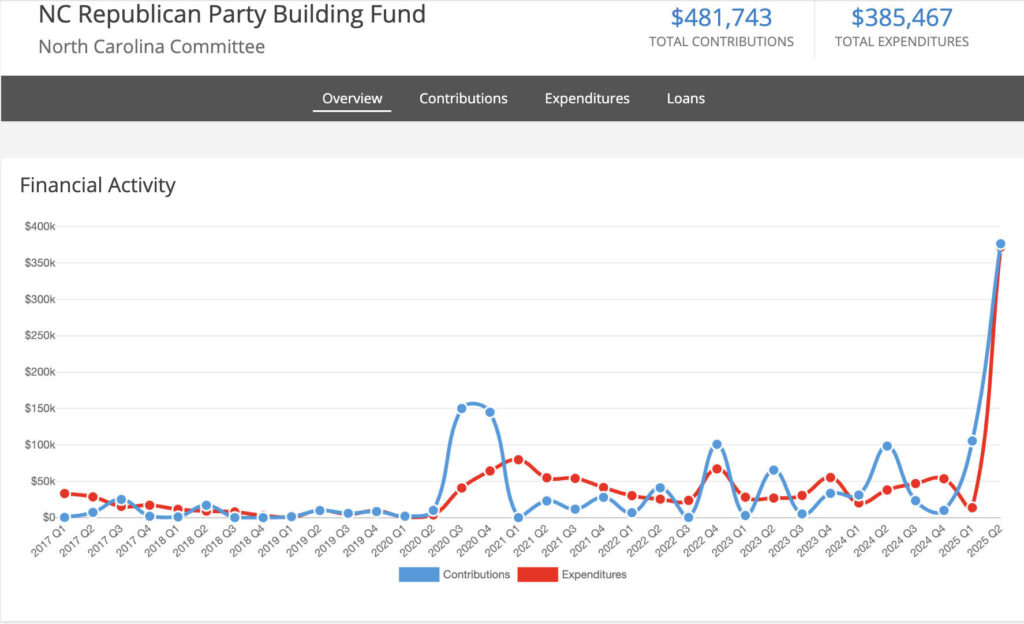
Duke Energy contributed to the GOP’s Building Fund on Feb. 14, Valentine’s Day, making it the top corporate donor to the fund to date. Less than a month later, on March 11, Republican state Sen. Paul Newton introduced S. 261, legislation allowing Duke Energy to drop its 2030 climate targets and to charge customers for incomplete plants. Lawmakers eventually approved the measure, which became S. 266, over Gov. Stein’s veto. Newton served as Duke Energy’s North Carolina president until 2015 and was elected to the Senate the following year, becoming one of the top recipients of Duke Energy money. He’s since left office to serve as UNC Chapel Hill’s lawyer.
Duke Energy funding GOP extremism
Before 2010, when party control of the North Carolina legislature was still competitive, Duke’s PAC giving was split almost evenly between Democratic and Republican lawmakers. But that year, the Republican State Leadership Committee — a 527 group that Duke Energy also supports financially — launched the Redistricting Majority Project, or REDMAP, to carry out extreme gerrymandering with the help of powerful new computer tools in states including North Carolina.
At the same time, Duke Energy began ramping up its spending on Republican legislative candidates in the state. While the company’s PAC contributions to the two major parties were almost even until the 2008 election cycle, a partisan spending disparity emerged in 2010 and eventually widened to six figures, according to data from FollowTheMoney.org.
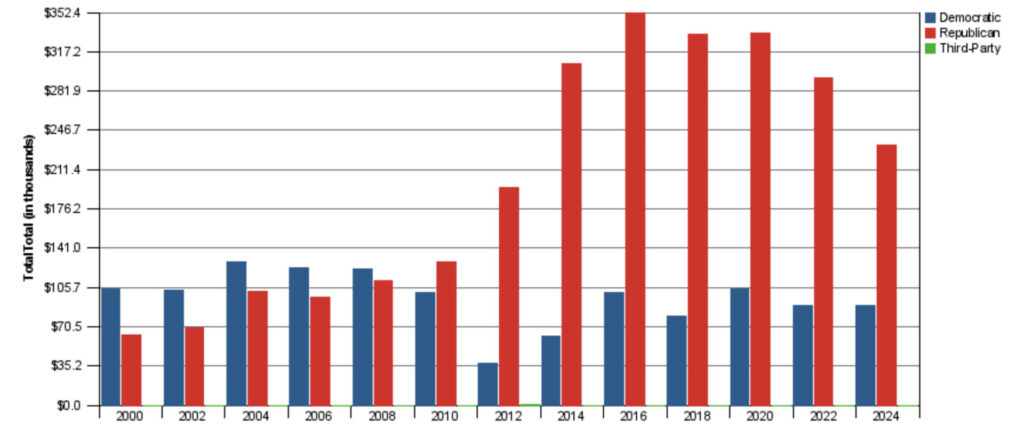
That data shows Duke Energy didn’t just follow North Carolina’s right-wing turn; it helped finance it. Since REDMAP, the percentage of Duke Energy’s PAC giving that has gone to Republican legislators has significantly exceeded the percentage of seats they hold in Raleigh — in some years by as much as 25%.
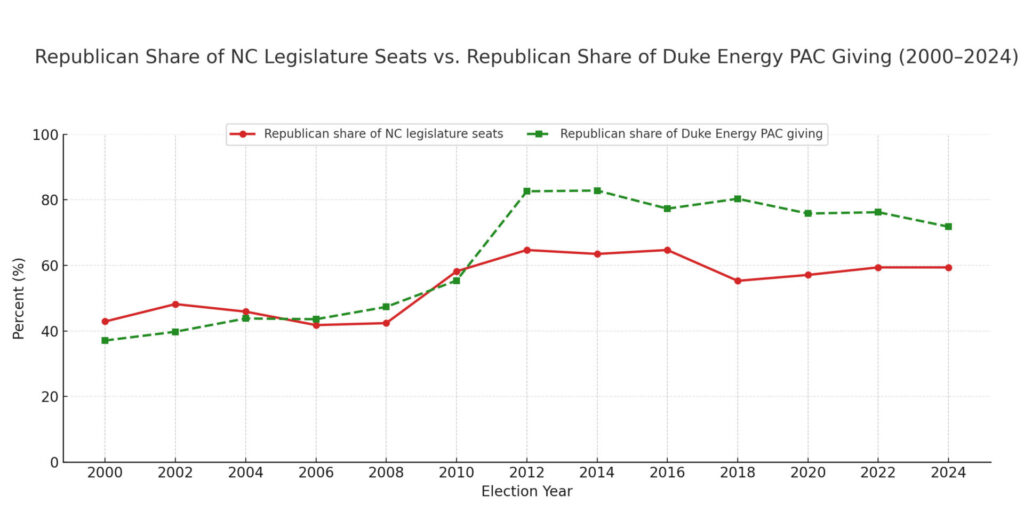
Conversely, Duke Energy’s political giving to Democrats is less than their share of seats in the legislature.
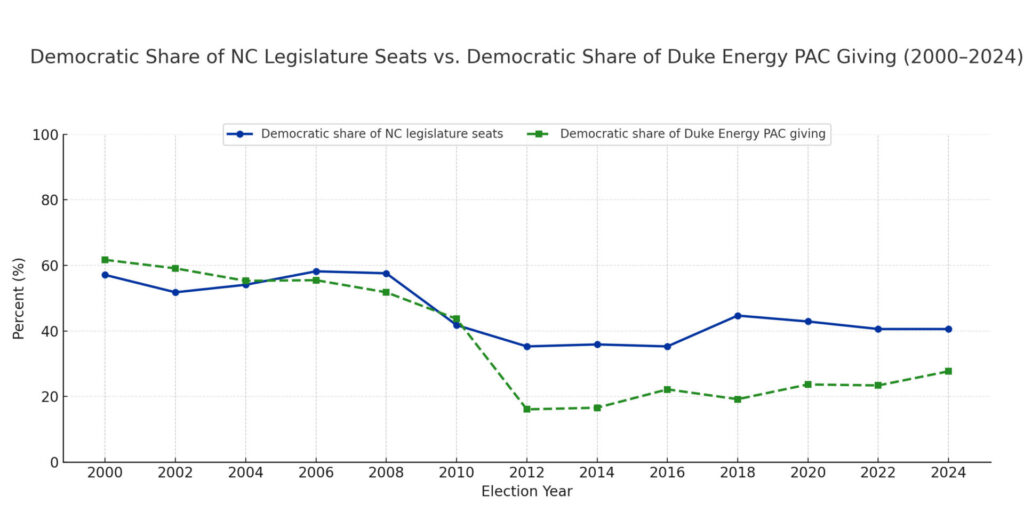
Duke Energy’s lopsided political giving doesn’t appear to be breaking any campaign finance laws; this is all allowed, even for a monopoly utility. Environmental groups tried to get stricter rules imposed back in 2018, when NC WARN and Friends of the Earth petitioned the North Carolina Utilities Commission to limit influence spending by investor-owned monopolies like Duke. In response, regulators tightened some rules against making customers pay for politicking, but they rejected petitioners’ request to ban such activity funded by shareholders, so utility companies can still freely spend profits on politics. A bill to shield Duke Energy’s ratepayers from paying for its political activities was introduced this year by a group of Democratic lawmakers but did not receive a hearing in committee.



